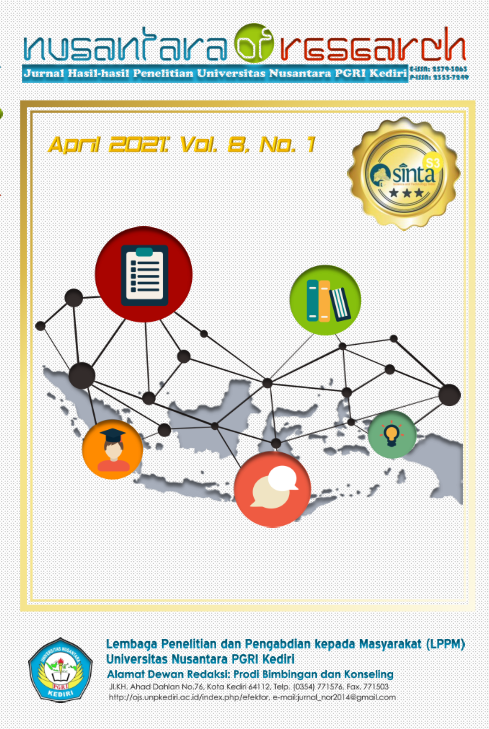Effectiveness of Group Guidance Services With Role-Playing Techniques to Reduce Student Aggressive Behavior
Main Article Content
Abstract
The provision of group guidance services with role playing technique aims to reduce aggressive behavior, because in this role playing technique students are given a description related to aggressive behavior that must be reduced so as not to become disruptive in megajar learning activities as well as the surrounding environment. The purpose of this study was to find out the effectiveness of group guidance services with role playing techniques to reduce aggressive behavior. This research is a pre-experimental research with the design of One Group Pretest-Posttest Design research, which is research using one group that acts as the subject of experimentation. Based on the results of the study, it is known that the frequency of aggressive behavior can be reduced through group guidance services with role playing techniques in elementary school students. This is evidenced from the results of data analysts using T-test where obtained a significant value of 0.000 <0.05 , it can be concluded that there is a significant difference between the results of pretest and postes values. These results show that Ho was rejected and Ha accepted. Thus it can be stated that group guidance services with role playing techniques affect the frequency of aggressive behavior.
Downloads
Article Details
Issue
Section
Authors who publish with this journal agree to the following terms:
- Copyright on any article is retained by the author(s).
- The author grants the journal, the right of first publication with the work simultaneously licensed under a Creative Commons Attribution License that allows others to share the work with an acknowledgment of the work’s authorship and initial publication in this journal.
- Authors are able to enter into separate, additional contractual arrangements for the non-exclusive distribution of the journal’s published version of the work (e.g., post it to an institutional repository or publish it in a book), with an acknowledgment of its initial publication in this journal.
- Authors are permitted and encouraged to post their work online (e.g., in institutional repositories or on their website) prior to and during the submission process, as it can lead to productive exchanges, as well as earlier and greater citation of published work.
- The article and any associated published material is distributed under the Creative Commons Attribution-ShareAlike 4.0 International License
How to Cite
References
Anantasari. 2006. Menyikapi Perilaku Agresif Anak. Yogyakarta: Kanisius.
Anne Anastasi. 2007. Tes Psikologi Psychological Testing. Jakarta: Indeks.
Arikunto, Suharsimi. 2014. Prosedur Penelitian Suatu Pendekatan Praktek. Jakarta: Rineka Cipta.
Baron, Robert A & Byrne, Donn. 2002. Psikologi Sosial. Jakarta: Erlangga.
Calhoun, E et al,. 2011. Model Of Teaching Model-Model Pembelajaran. Yogyakarta: Pustaka Belajar.
Huda. 2014. Model-model Pengajaran dan Pembelajaran. Yogyakarta: Pustaka Belajar.
http://news.liputan6.com/read/2126996/hendak-bantu-temannya-tawuran-pelajarsmp-diciduk-polisi, Diunduh 22 Maret 2015.
http://www.tempo.co/read/news/2013/11/20/064531161/Tawuran-Pelajar-SMPSatu-Orang-Tewas, Diunduh 22 Maret 2015.
Kusmawati, N & Sukardi, Dewa K. 2008. Proses Bimbingan dan Konseling di Sekolah. Jakarta: Rineka Cipta.
Nurihsan, Achmad J. 2009. Bimbingan dan Konseling dalam Berbagai Latar Belakang. Bandung: Refika Aditama.
Petrus, Jerizal. 2012. Model Bimbingan Kelompok Berbasis Nilai-Nilai Budaya Hibualamo Untuk Meningkatkan Kecerdasan Sosial Siswa. Jurnal Bimbingan Konseling Vol.1(2).
Romlah, T. 2013. Teori dan Praktek Bimbingan Kelompok. Malang: Universitas Negeri Malang.
Siddiqah. 2010. Pencegahan dan Penanganan Perilaku Agresif Remaja Melalui pengelolaan Amarah (Anger Management). Jurnal Psikolog Universitas Gadjah Mada (Online), Vol. 37(1).
Sugiyono. 2017. Metode Penelitian Kuantitatif, Kualitatif, dan R&D. Bandung : CV. Alfabeta.
Suntari, Eria. Pengaruh Bimbingan Kelompok Dengan Teknik Role Playing Terhadap Kecenderungan Perilaku Agresif Siswa Kelas VIII-E SMP N 1 Barat Magetan. E-Journal Counsellia Jurusan Bimbingan Konseling, Vol. 2(1).
Thalib, Syamsul B. 2010. Psikologi Pendidikan Berbasis Analisis Empiris Aplikatif. Jakarta: Kencana.
Tohirin. 2007. Bimbingan dan Konseling di Sekolah dan Madrasah. Jakarta: Raja Grafindo Persada.




